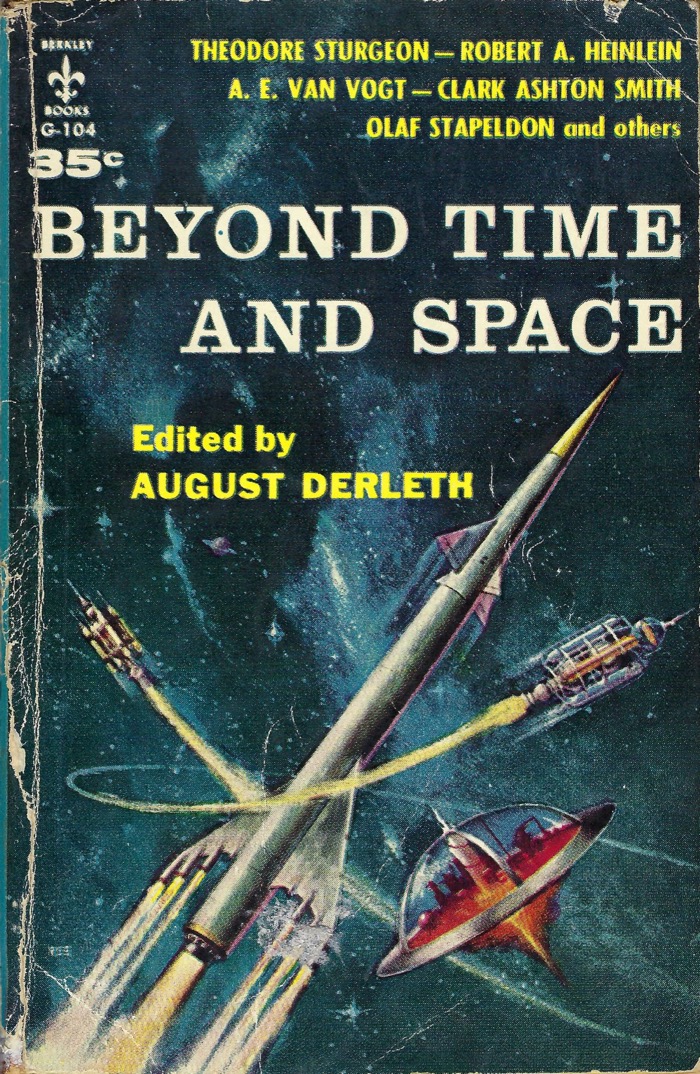Beyond Time and Space
Reviewed date: 2025 Aug 24
174 pages
The Long Watch is competent but not great. I enjoyed Minority Report but I had been tipped off to the secret so the thrill was gone. Fessenden's Worlds was good too.
I did not care the others: Colossus and A Voyage to Sfanomoë were particularly bad, as was The Seesaw. The excerpt from Last and First Men didn't hold up on its own. Humpty Dumpty Had a Great Fall was a mildly interesting concept but poorly executed.
The Long Watch
by Robert A. Heinlein
Colonel Towers, commander of the moon base, has decided to bring peace to mankind by seizing control of the nuclear bombs on the moon and threatening to blow up cities on Earth unless and until the nations disarm. And of course to make his commitment clear, he will demonstrate on a few unimportant cities. Towers tries to enlist Lieutenant Johnny Dalquist, but Dalquist instead disarms and sabotages the bombs--exposing himself to deadly radiation and sacrificing himself to save humankind from Towers's megalomania.
Minority Report
by Theodore Sturgeon
Brave explorers leave Earth and discover the horrifying reality: Earth and its solar system are a rare "matter" solar system in a galaxy almost entirely made of antimatter. The solar system is quarantined for it--and everyone else's--safety.
Colossus
by Donald Wandrei
A scientist develops a FTL spaceship and uses it to explore the boundary of the universe. He pops through the universe and finds himself in another, larger universe--where he is now on a slide under a microscope in a lab peopled by large alien Titans. The Titans threaten to dissect him (for science!) but he convinced them to let him go explore a neighboring planet in their solar system and bring them back data (and a dead alien for them to dissect (for science!!)) The Titans agree, so the scientist travels to the planet, lands, and meets a local girl. The end.
A Voyage to Sfanomoë
by Clark Ashton Smith
Brother Hotar and Evidon build a spaceship and leave doomed Atlantis to explore Sfanomoë (Venus) which they hope will be a suitable world for colonization. They find a world of jungle and flowers, and then they turn into flowers. The end.
The Seesaw
by A. E. van Vogt
A Weapon Shops of Isher store. McAllister steps into an Isher weapon shop in 1947. The shopkeepers realize he's from the past, so they hustle him into a special non-conduction insulating suit, and throw him back into the past. He's the counter-weight of a time-fulcrum, something incomprehensibly to do with Isher and the war or whatever. McAllister seesaws back and forth between the past and the future, eventually ending up floating in space before the Earth was form--at which point he decides to unzip the suit, release the tremendous temporal energy stored in himself, and blow up in an explosion so large that it triggers the formation of the planets. Uh, yeah, OK. This one is not a winner.
The Flying Men
an except from Last and First Men
by Olaf Stapledon
A history of the seventh race of man, a race that has bred itself to fly and lives most of its life in the skies of Venus (mankind having long since abandoned Earth.) The flying men exist for a hundred million years, but eventually succumb when they are unable to sustain their population. An increasing number of babies are born as mutants unable to fly, and eventually the flightless race assets authority. The remaining flying men opt for a dignified end: mass racial suicide by flying into an active volcano—an act of artistry and beauty—rather than drag out their remaining time serving as slaves to the flightless men.
I enjoyed Last and First Men, but this except doesn't stand well on its own.
Fessenden's Worlds
by Edmond Hamilton
This is the second story in this collection that's about tiny universes. Bradley visits his old colleague Fessenden and discovers that Fessenden has created a tiny universe in his laboratory so he can study the nature of the universe up close. Bradley is horrified to discover that Fessenden spends his time causing disasters to observe how various intelligent species in his universe respond: he throws a comet at one planet, causes a sun to overheat and cook another planet. He brings two peaceful species into close proximity to watch them go to war and annihilate each other.
Bradley confronts Fessenden, and in the ensuing struggle Fessenden trips and falls into his tiny universe, causing his own death, the destruction of his universe, and starting a fire that engulfs his lab. Bradley escapes, but is unable to continue his work as an astronomer: every time he looks at the stars he wonders if he is living in a constructed universe that is the plaything for some other mad scientist in a higher universe.
Humpty Dumpty Had a Great Fall
by Frank Belknap Long
A portal opens to an alternate dimension where strange beings act out what appears to be the inspiration for the rhymes and stories of Mother Goose Nursery Rhymes. But this is a dangerous and deadly world.
